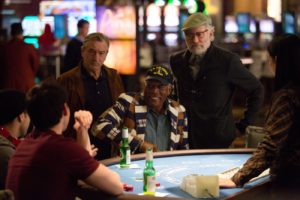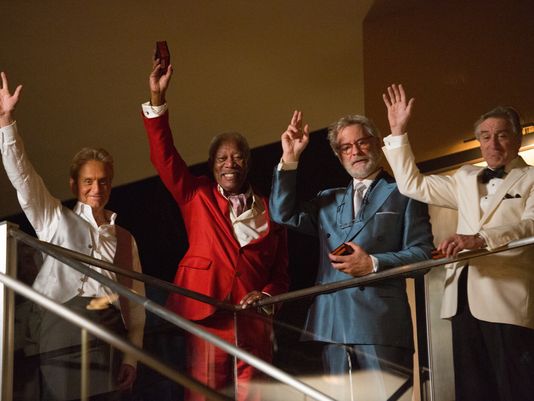While not surprising, most reviews on Jon Turtletaub’s 2013 comedy “Last Vegas” liken it to the sensation “The Hangover” or refer to it as “The Hangover for old people.” Regrettably this does the film a disservice, as it shares very little with the former save taking place in Las Vegas and its cast members sometimes patronizing a casino. What you would expect, given names like Freeman, Kline, De Niro, and Douglas, is an over-the-top tough-guy fest, but, alas, this is not what we get either. “Last Vegas” is funny, clever, and, under it all, surprisingly endearing. The film somehow manages to ride the fine line between raunchy and cheesy, yet rides this line with class, humor, and, above all, wit.
“Last Vegas’” plot is fairly straightforward. Childhood chums Billy, Paddy, Archie, and Sam (Michael Douglas, Robert De Niro, Morgan Freeman, and Kevin Kline) are now 70-somethings and wondering where all the years went. Sam is seemingly unhappily married, Archie is micromanaged by his overprotective son, and Billy is mourning the recent death of his wife. The group is called back together by womanizer Billy, who, at the age of 70, is getting married for the first time. While some drama ensues (we learn that Paddy and Billy have a years-long grudge that has yet to be resolved), the four land in Vegas to show Billy one last romp before his wedding to his 30-year-old bride.
While the film’s beginning would have you believe Douglas is merely playing himself in this film, or rehashing old performances, “Last Vegas” quickly becomes about the friendship and camaraderie these four men have while also underlining the importance of living life to the fullest, even in old age.
 As Billy, Douglas becomes a character all his own – part womanizer, part vulnerable, and part repentant for wrongs against his friend Paddy (which will not be disclosed here). Likewise, the film’s other players use the extensive films that have lined their past to bring life into these men. Freeman is nothing but loveable as Archie, who just wants his son Ezra (Michael Ealy) to treat him like an adult. He brings spark and heart to Archie, and we see nothing of his action past in films such as “Along Came a Spider” or “Se7en” here. Kline also does a good job, bringing a sense of humor to the role, especially as his character goes on a quest to use his “Hall Pass” – his wife, in an attempt to fix their marriage, gives him the chance to cheat on her and use a Viagra she gives him – which of course works its way into the film in an unexpected and sweet way. Lastly, De Niro here shines as Paddy. Initially coming off gruff and typical, throughout the film De Niro makes us forget his gangster past in films such as “Goodfellas” or “Casino,” bringing a likeable, warm character we really care for. All in all, the foursome do an excellent job becoming these characters, where simply playing old roles would have been infinitely easier for them.
As Billy, Douglas becomes a character all his own – part womanizer, part vulnerable, and part repentant for wrongs against his friend Paddy (which will not be disclosed here). Likewise, the film’s other players use the extensive films that have lined their past to bring life into these men. Freeman is nothing but loveable as Archie, who just wants his son Ezra (Michael Ealy) to treat him like an adult. He brings spark and heart to Archie, and we see nothing of his action past in films such as “Along Came a Spider” or “Se7en” here. Kline also does a good job, bringing a sense of humor to the role, especially as his character goes on a quest to use his “Hall Pass” – his wife, in an attempt to fix their marriage, gives him the chance to cheat on her and use a Viagra she gives him – which of course works its way into the film in an unexpected and sweet way. Lastly, De Niro here shines as Paddy. Initially coming off gruff and typical, throughout the film De Niro makes us forget his gangster past in films such as “Goodfellas” or “Casino,” bringing a likeable, warm character we really care for. All in all, the foursome do an excellent job becoming these characters, where simply playing old roles would have been infinitely easier for them.
One of the other fun parts about Last Vegas is the inclusion of a lively, energetic soundtrack, as well as pleasing performances from supporting actors. As a potential love interest for different members of the group, Katherine Keener (“The 40 Year Old Virgin”) is charming and likeable, as is fellow comedic alum Romany Malco as a hotel escort entrusted with catering to the foursome after they win some serious money in the casino. Additionally, a young punk, Dean (Jerry Ferrara), and the comedic appearance of rapper 50 Cent add to an already fun film. The film’s soundtrack is also varied and engaging, featuring such classics as “Cat’s in the Cradle,” and the dance-inspiring “September” by Earth, Wind, and Fire, as well as Pitbull’s “Don’t Stop the Party” and 50 Cent’s “True Loyalty.”
 What works most about “Last Vegas” lies in simplicity. The film doesn’t try to be what it’s not by pretending to be a Vegas party film, but instead takes the time explore its characters and the bond they have together. What is impressive is that with only an introductory 5-minute scene showing the four friends as children growing up, Kline, De Niro, Freeman, and Douglas are able to sell the foursome to us as a cohesive unit that care about each other. This is due no doubt to their acting ability, but they also have great chemistry as a unit, which is interesting since, while powerhouses in their own films, there was the potential for overacting and power struggles. Thankfully, none of this is present in “Last Vegas,” which works equally well as a drama and a comedy (which should come as no surprise given Turteltaub’s previous efforts such as the wonderful “Phenomenon“).
What works most about “Last Vegas” lies in simplicity. The film doesn’t try to be what it’s not by pretending to be a Vegas party film, but instead takes the time explore its characters and the bond they have together. What is impressive is that with only an introductory 5-minute scene showing the four friends as children growing up, Kline, De Niro, Freeman, and Douglas are able to sell the foursome to us as a cohesive unit that care about each other. This is due no doubt to their acting ability, but they also have great chemistry as a unit, which is interesting since, while powerhouses in their own films, there was the potential for overacting and power struggles. Thankfully, none of this is present in “Last Vegas,” which works equally well as a drama and a comedy (which should come as no surprise given Turteltaub’s previous efforts such as the wonderful “Phenomenon“).
As a comedy, “Last Vegas” is extremely funny and should please fans of comedy both young and old. While some jokes are baldly aimed at the advanced age of its protagonists (such as one casino-goer observing “This is the only bachelor party that could be covered by Medicare”), others involving Ferrara and Malco should appeal to younger viewers. The film is definitely an all-ages endeavor, despite critical lashings that it might appeal only to older adults. Additionally, the movie pulls its characters full circle, going back to their youth and events that formed their present. There’s a maturity to “Last Vegas” (no pun intended) that is a wonderful exercise in scriptwriting, humor, and fun. A warm effort that’s equally laugh-out-loud funny and earnestly rewarding.
– by Mark Ziobro


